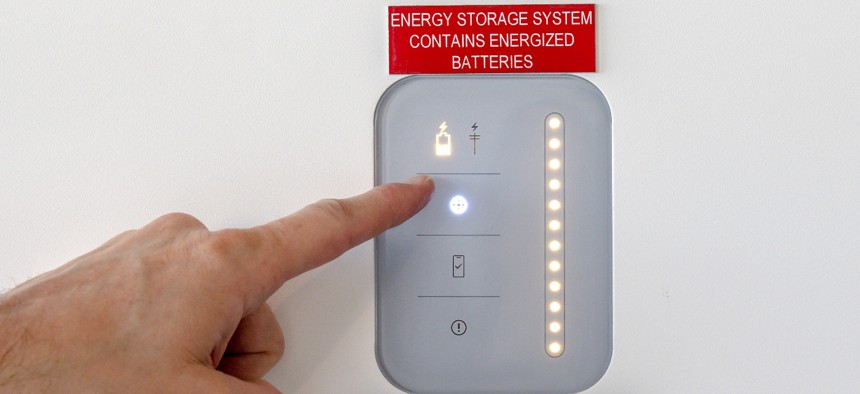What is a virtual power plant? An energy expert explains

Watchara Phomicinda/MediaNews Group/The Press-Enterprise via Getty Images
COMMENTARY | Virtual power sources typically are quicker to site and build, and can be cleaner and cheaper to operate, than new power plants.
After nearly two decades of stagnation, U.S. electricity demand is surging, driven by growing numbers of electric cars, data centers and air conditioners in a warming climate. But traditional power plants that generate electricity from coal, natural gas or nuclear energy are retiring faster than new ones are being built in this country. Most new supply is coming from wind and solar farms, whose output varies with the weather.
That’s left power companies seeking new ways to balance supply and demand. One option they’re turning to is virtual power plants.
These aren’t massive facilities generating electricity at a single site. Rather, they are aggregations of electricity producers, consumers and storers – collectively known as distributed energy resources – that grid managers can call on as needed.
Some of these sources, such as batteries, may deliver stored electric power. Others may be big electricity consumers, such as factories, whose owners have agreed to cut back their power use when demand is high, freeing up energy for other customers. Virtual power sources typically are quicker to site and build, and can be cleaner and cheaper to operate, than new power plants.
A growing resource
Virtual power plants aren’t new. The U.S. Department of Energy estimates that there are already 30 to 60 gigawatts of them in operation today. A gigawatt is 1 billion watts – roughly the output of 2.5 million solar photovoltaic panels or one large nuclear reactor.
Most of these virtual power plants are industrial customers that have agreed to reduce demand when conditions are tight. But as growing numbers of homes and small businesses add rooftop solar panels, batteries and electric cars, these energy customers can become not only consumers but also suppliers of power to the grid.
For example, homeowners can charge up their batteries with rooftop solar when it’s sunny, and discharge power back to the grid in the evening when demand is high and prices sometimes spike.
As smart thermostats and water heaters, rooftop solar panels and batteries enable more customers to participate in them, DOE estimates that virtual power plants could triple in scale by 2030. That could cover roughly half of the new capacity that the U.S. will need to cover growing demand and replace retiring older power plants. This growth would help to limit the cost of building new wind and solar farms and gas plants.
And because virtual power plants are located where electricity is consumed, they’ll ease the burden on aging transmission systems that have struggled to add new lines.
New roles for power customers
Virtual power plants scramble the roles of electricity producers and consumers. Traditional power plants generate electricity at central locations and transmit it along power lines to consumers. For the grid to function, supply and demand must be precisely balanced at all times.
Customer demand is typically assumed to be a given that fluctuates with the weather but follows a fairly predictable pattern over the course of a day. To satisfy it, grid operators dispatch a mix of baseload sources that operate continuously, such as coal and nuclear plants, and more flexible sources such as gas and hydropower that can modulate their output quickly as needed.
Output from wind and solar farms rises and falls during the day, so other sources must operate more flexibly to keep supply and demand balanced. Still, the basic idea is that massive facilities produce power for millions of passive consumers.
Virtual power plants upend this model by embracing the fact that consumers can control their electricity demand. Industrial consumers have long found ways to flex their operations, limiting demand when power supplies are tight in return for incentives or discounted rates.
Now, thermostats and water heaters that communicate with the grid can let households modulate their demand too. For example, smart electric water heaters can heat water mostly when power is abundant and cheap, and limit demand when power is scarce.
In Vermont, Green Mountain Power is offering its customers incentives to install batteries that will provide power back to the grid when it’s needed most. In Texas, where I live, deadly blackouts in 2021 highlighted the importance of bolstering our isolated power grid. Now, utilities here are using Tesla Powerwalls to help turn homes into virtual power sources. South Australia aims to connect 50,000 homes with solar and batteries to build that country’s largest virtual power plant.
Virtual power, real challenges
Virtual power plants aren’t a panacea. Many customers are reluctant to give up even temporary control of their thermostats, or have a delay when charging their electric car. Some consumers are also concerned about the security and privacy of smart meters. It remains to be seen how many customers will sign up for these emerging programs and how effectively their operators will modulate supply and demand.
There also are challenges at the business end. It’s a lot harder to manage millions of consumers than dozens of power plants. Virtual power plant operators can overcome that challenge by rewarding customers for allowing them to flex their supply and demand in a coordinated fashion.
As electricity demand rises to meet the needs of growing economies and replace fossil fuel-burning cars and furnaces, and reliance on renewable resources increases, grid managers will need all the flexibility they can get to balance the variable output of wind and solar generation. Virtual power plants could help reshape electric power into an industry that’s more nimble, efficient and responsive to changing conditions and customers’ needs.
![]()
Daniel Cohan, Associate Professor of Civil and Environmental Engineering, Rice University
This article is republished from The Conversation under a Creative Commons license. Read the original article.
NEXT STORY: 3 keys to CX success





